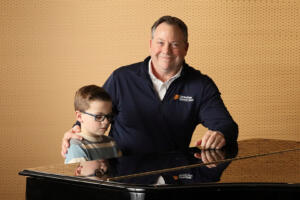When Freehold resident John Russo fell after a progressive decline in his ability to walk, he figured he’d have to endure another joint replacement surgery. But he was shocked to learn that a serious spinal condition was causing his pain—and partial paralysis.
John, 54, was in the Navy during the Gulf War when he suffered an injury. Since then, he has lived with chronic pain and undergone multiple surgeries, including knee and shoulder replacement surgeries. John was forced to retire from a job he loved as his health continued to decline.
Last March, he felt increasingly tired and weak. He started using a cane and his physician said to report back if he felt worse. After several falls, John began using a walker in the house and sleeping downstairs to avoid stairs. Then, in late April, his legs gave out again. At that point, John realized he was no longer in pain; he had no feeling in his legs at all. After talking with his doctor at the VA hospital, his wife, and his 14-year-old twins, he called 911 to be taken to CentraState’s Emergency Department.
Upon reviewing test results, board-certified neurosurgeon Mark McLaughlin, MD, determined that John’s spine was being attacked by degenerative bone disease. Severe narrowing of his spinal canal was pinching his nerves, causing them to swell. Without surgery, he could become permanently paralyzed.
“I never would have thought that my spine was causing the issues,” recalls John.
Dr. McLaughlin performed emergency lumbar decompression surgery in April to release the pressure on John’s nerves. After a few days in the hospital, John began physical and occupational therapy, ultimately with the help of three rehabilitation centers. During his recovery, a bout with COVID-19 complicated the wound healing process. But according to John, he prevailed due to his “never-give-up mentality,” attributed in part to his Brooklyn roots and his father.
John learned how to walk again and slowly regained his muscle strength. He was finally discharged from rehabilitation in August, in time to celebrate his birthday with his family. Now home, he is walking a bit further each week and his pain improves every day. He uses a scooter to get to his son’s football games.
“Full recovery can take 12 to 18 months,” explains Dr. McLaughlin. “Given his situation, John is making a remarkable recovery.”
John’s next hurdle is to control his weight to reduce stress on his spine. He is dieting and exercising as much as he can in this stage of his recovery and is looking forward to qualifying for bariatric surgery in the future.
“I’ve been through a lot, and it’s been hard emotionally and physically,” John says. “Russos never give up, so I’m going to keep pushing forward.”
What is Degenerative Spine Disease?
- Caused by spine trauma, disc herniation or bulge, or advanced arthritis
- Moderate and severe forms usually require surgery
- Milder forms can be corrected with therapy and pain medication
- Symptoms include excruciating back pain that radiates into buttocks and/or down legs, and issues
For more information about neurosurgery at CentraState, visit centrastate.com/neurosurgery or call 866-CENTRA7 (866-236-8727).





